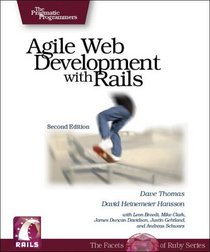Search -
Agile Web Development with Rails
Agile Web Development with Rails
Author:
The definitive, Jolt-award winning guide to learning and using Rails is now in its Second Edition. Rails is a new approach to web-based application development that enables developers to create full-featured, sophisticated web-based applications using less code and less effort. Now programmers can get the job done right and still leave work on t... more »
Author:
The definitive, Jolt-award winning guide to learning and using Rails is now in its Second Edition. Rails is a new approach to web-based application development that enables developers to create full-featured, sophisticated web-based applications using less code and less effort. Now programmers can get the job done right and still leave work on t... more »
ISBN-13: 9780977616633
ISBN-10: 0977616630
Publication Date: 12/14/2006
Pages: 720
Edition: 2
Rating: 3
ISBN-10: 0977616630
Publication Date: 12/14/2006
Pages: 720
Edition: 2
Rating: 3
3.8 stars, based on 3 ratings
Genres:
- Computers & Technology >> Web Development & Design >> Web Design
- Computers & Technology >> Web Development & Design >> Programming >> JavaScript
- Computers & Technology >> Web Development & Design >> Web Services
- Computers & Technology >> Networking & Cloud Computing >> Data in the Enterprise >> Client-Server Systems
- Computers & Technology >> Programming Languages
- Computers & Technology >> Programming >> Software Design, Testing & Engineering >> Object-Oriented Design
- Computers & Technology >> Internet & Social Media
- Reference





